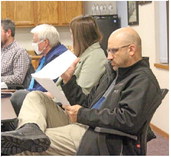Seeking balance


Compromise plan lets contact traced students remain in school
NEWS EDITOR
It took more than an hour of sometimes heated discu...


Compromise plan lets contact traced students remain in school
NEWS EDITOR
It took more than an hour of sometimes heated discu...